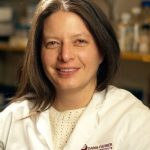
Funded by the Dick Vitale Gala, in memory of Benji Gilkey
T-cell acute lymphoblastic leukemia is an aggressive cancer that is most common in teenagers. Many patients cannot be cured, even with intensive chemotherapy. Our goals are to understand why chemotherapy does not cure some patients, and use this knowledge to improve treatment. We found that chemotherapy cannot cure patients whose leukemia cells are very difficult to kill in a test called BH3 profiling. This proposal is focused on mutations of a gene called JAK3 as a cause of death resistance of leukemia cells. This idea could be immediately translated into a clinical trial because JAK3-blocking drugs are already FDA-approved for clinical use. Here, we will ask the following questions: 1) Do JAK3 mutations block cell death in leukemia cells? 2) Will a JAK3-blocking drug improve the effectiveness of chemotherapy? 3) Is a JAK3-blocking drug safe and effective for the treatment of children with T-cell acute lymphoblastic leukemia? Successful completion of this project could lead to more effective treatment options for children with this particularly high-risk subset of T-cell leukemia.

2017 V Foundation Wine Celebration Vintner Grant in honor of David and Kary Duncan
Myelodysplastic Syndromes (MDS) and Acute Myeloid Leukemia (AML) are blood cancers diagnosed in approximately 25,000 and 19,000 individuals each year in the US, respectively. Despite an enormous global effort, the treatments and outcomes for patients with MDS and AML have not improved significantly over the past 4 decades. The purpose of this study is to evaluate a new idea for MDS/AML therapy to see if there is sufficient promise to launch a clinical trial for patients at our center.
By studying the genomes (the DNA blueprint in all cells) of patients with MDS/AML, the scientists involved in this proposal identified mutations (“mistakes”) in a structure called the spliceosome. These spliceosome mutations are very common in patients with MDS/AML. We recently found that the spliceosome-mutant cells are more readily killed in the laboratory by two drugs that are currently being tested in clinical trials for other cancers.
In this project, we will test these two drugs alone and in combination using systems that we have developed in the laboratory. We will determine how, at the molecular level, these drugs kill the spliceosome-mutant cells and how they may become resistant to these treatments. Finally, we will develop tests to monitor the effects of these drugs when given to patients with MDS/AML. Since these drugs are already in clinical development for other indications, we expect that our work will rapidly help lay the foundation for clinical trials to see if these drugs offer new hope for patients with MDS and AML.

Funded by The V Foundation Wine Celebration Vintner Grant
In honor of Chuck and Anne McMinn
Funded by the 2013 V Foundation Wine Celebration

Funded by the Dick Vitale Gala









